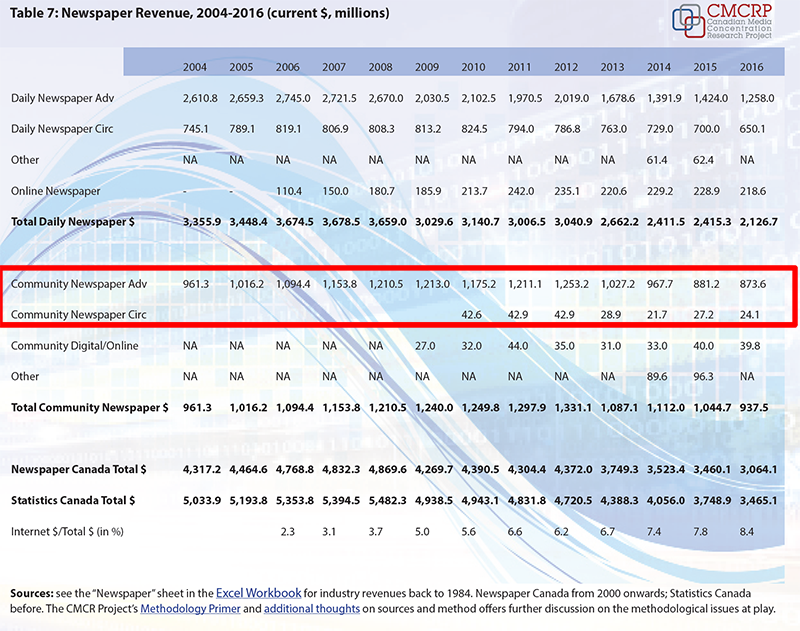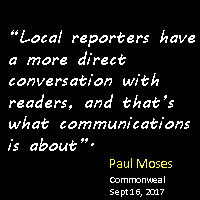by John Borst, editor Rotary Club of Dryden Website
In May of this year The Dryden Observer ceased to publish and the community of Dryden loss a little of its soul. Somewhat ironically it was Pope Francis speaking to an audience of Italian journalists on September 16th who reminds us why the local community newspaper is vital in the life of a community.

Pope Francis shared two fundamental reasons with the journalists. First, he said “I would say that (local news coverage) is the most genuine and the most authentic in the mass-media world.” The reason is that its “precise mission” is “to immerse oneself in the daily, local reality, made up of people, events, projects, problems, and hopes.” 1
Secondly he went on ““The second is to intercept the same reality, to be able to transmit to a wider horizon all those values that belong to the life and history of the people, and at the same time give voice to poverty, challenges, sometimes urgent issues in the territories, along the streets, meeting families, in places of work.” 2
For one-hundred and twenty-two years first as the Wabigoon Star, and later as The Observer our little paper has been the voice of the people of Dryden. When Norwest Printing and Publishing Group closed its doors, there was no voice to bemoan its loss. We were faced with silence because we had no alternative to express our grief at its demise. Neither CKDR nor Q104’s Dryden Now websites have the resources or history to provide editorial reaction in the same way that a weekly newspaper provides.
A good share of the blame for this loss rests with electronic behemoths Google and Facebook who now soak up all the advertising dollars. Together they account for more than 75% of all internet advertising revenue.
As the Canadian Media Concentration Research Project reports “Newspapers are in turmoil, and massive upheaval continues to accurately describe their plight. The turmoil stems from self-inflicted wounds and general trends in the economy, especially the relative and per capita decline in advertising revenue and the diversion of what’s left to Google and Facebook.” and concludes “The collapse of advertising reveals ...It’s time to figure out who will pay what all over again, and while the “pay-per” model will pick up some of the slack, it won’t be enough and comes with the additional problem that it aggravates information inequality”.

The question then becomes are community newspapers, especially small-town weeklies a public good? This is at the heart of Pope Francis comments. He is not talking about their financial stability but rather asking us to frame the question in moral terms.
At the policy level do governments have a role to play in helping us keep our community newspapers alive? As the localnewsmap.geolive.ca shows every region of Canada is facing the loss of community newspapers. (In Northwestern Ontario The Observer has been accompanied by newspapers in Red Lake, Rainy River and Manitouwadge.) To this end the Liberal government instituted the Creative Canada Policy Framework under Heritage Minister Mélanie Joly however, as the Toronto Star editorialized “In a speech announcing the new policy, Heritage Minister Mélanie Joly said the Liberal government has no plan “to bail out industry models that are no longer viable.” This lack of support for news production is the framework’s most disastrous failing.” In other words, this is not just a cultural issue but a financial issue and should be addressed by the Finance Minister Bill Morneau as well.
One solution may be the creation of Not-for-Profit Community newspapers supported by new measures with more robust tax incentives. A combination of volunteerism and paid staff may work. At the very least Google and Facebook should be taxed on their advertising revenues in ways that they are not now with the revenue going to support community news generation.
Canada is currently in an election. During election campaigns it was our local newspaper who asked questions of our local candidates for office. Their published replies were a key source where we could read their ideas and judge for ourselves the quality of each candidate. No big city regional daily newspaper is going to do this. This is even more important at the municipal level. I do not think it too strong a concern to conclude that we are less of a democracy without our community weekly news source.
 Internet giants Google, Facebook and Twitter have been irresponsible in not moderating the rise of hate speech and fake news. Clicks and “Likes” have been their only concern. Unscrupulous politicians, even Presidents have taken advantage of this wild west mentality. It is our journalists working for large community newspapers who are the bulwark against such leaders morphing into dictatorships. Small town papers play the same role at the local level.
Internet giants Google, Facebook and Twitter have been irresponsible in not moderating the rise of hate speech and fake news. Clicks and “Likes” have been their only concern. Unscrupulous politicians, even Presidents have taken advantage of this wild west mentality. It is our journalists working for large community newspapers who are the bulwark against such leaders morphing into dictatorships. Small town papers play the same role at the local level.In Dryden, Ontario it was The Observer who played this role in our community. The Wilson family took over the paper back in 1940. It was in financial trouble nearly twenty years ago. Roy Wilson came out of retirement and kept it going during his eighties. We owe him a debt of gratitude. More importantly we owe it to ourselves and our children to find a way to resurrect a community newspaper and we have every right to expect our governments to view newspapers as a “public good” worthy of a collective responsibility on behalf of all citizens.
1,2 Commonweal, The Voice of the People, Why Local Journalism Still Matters Paul Moses, September 17, 2019
